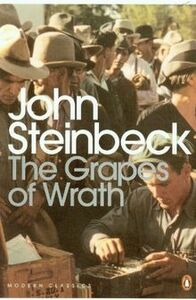Take a photo of a barcode or cover
challenging
dark
emotional
reflective
sad
tense
medium-paced
Plot or Character Driven:
A mix
Strong character development:
Yes
Loveable characters:
Yes
Diverse cast of characters:
Yes
Flaws of characters a main focus:
Complicated
dark
sad
slow-paced
dark
emotional
reflective
tense
medium-paced
Plot or Character Driven:
Plot
Strong character development:
Yes
Loveable characters:
Complicated
Diverse cast of characters:
No
Flaws of characters a main focus:
Yes
Very good. Exploration of the many for the few.
The great American novel - history the way it should be taught. Relates the greed of corporatist banking and the capture of America’s heartland farmers. Portrays the deep poverty of the time, and the dignity of those who survived it. Presents a California that we wouldn’t recognize today - well maybe in those spots of Jefferson - where migrants were cheated, abused, and exploited. Identifies the Trumpian behavior of a hundred years ago: hysteria, demonizing innocents, mob mentality raised to violence.
The matrilineal role increases in power and authority as the story unfolds, and Mrs. Joad finishes as the guiding force of the family.
Steinbeck was remarkable as an author who spoke truth to power with breathtaking prose.
The matrilineal role increases in power and authority as the story unfolds, and Mrs. Joad finishes as the guiding force of the family.
Steinbeck was remarkable as an author who spoke truth to power with breathtaking prose.
dark
emotional
reflective
tense
medium-paced
Plot or Character Driven:
A mix
Strong character development:
Complicated
Loveable characters:
Complicated
Diverse cast of characters:
No
Flaws of characters a main focus:
Yes
Darn good book. Great imagery. Phew jarring moments that felt unnecessary. Would recommend :)
Mighty powerful story, masterfully crafted and deeply compelling. Many lessons
adventurous
emotional
sad
medium-paced
Plot or Character Driven:
Character
Strong character development:
Yes
Loveable characters:
Yes
Diverse cast of characters:
No
Flaws of characters a main focus:
No
I will never complain again
بریدهای از کتاب، صفحهی ۲۵۴:
کیزی گفت: هر دوی اینها یه چیزن، پدربزرگ و خونهی قدیمی شما، هر دو یکی هستن.
آل گفت: به علاوه این بدشانسیه. پدربزرگ برامون نقل میکرد که چی کار میکنه؛ چهجوری انگورها رو بالای سرش میچلونه تا شیره از ریشش پایین بریزه، و دوز و کلکهای دیگه.
کیزی گفت: این واسه شوخی و خنده بود. من خیال میکنم که پدربزرگ میدونست. پدربزرگ عصری نمرد، همون وقت که از زمین جداش کردین مرده بود.
Spoiler
نوآ گفت: خیلی مضحکه... پدربزرگ مرد، من که چیز غیرعادی احساس نمیکنم. از وقتهای دیگه غصهدارتر نیستم.کیزی گفت: هر دوی اینها یه چیزن، پدربزرگ و خونهی قدیمی شما، هر دو یکی هستن.
آل گفت: به علاوه این بدشانسیه. پدربزرگ برامون نقل میکرد که چی کار میکنه؛ چهجوری انگورها رو بالای سرش میچلونه تا شیره از ریشش پایین بریزه، و دوز و کلکهای دیگه.
کیزی گفت: این واسه شوخی و خنده بود. من خیال میکنم که پدربزرگ میدونست. پدربزرگ عصری نمرد، همون وقت که از زمین جداش کردین مرده بود.
adventurous
challenging
emotional
reflective
tense
slow-paced
Plot or Character Driven:
Plot
Strong character development:
Yes
Loveable characters:
Complicated
Diverse cast of characters:
No
Flaws of characters a main focus:
No
man i would not be able to handle living thru the great depression and even tho living thru trumps america is absolute shit, i think this would’ve been worse. the book itself is really boring and i just didn’t care about any of the characters




